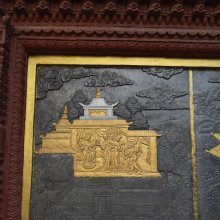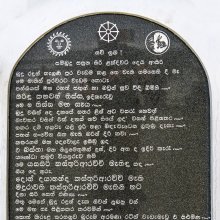Yashoda, Yaśodā, Yaśoda, Yashas-da: 15 definitions
Introduction:
Yashoda means something in Buddhism, Pali, Hinduism, Sanskrit. If you want to know the exact meaning, history, etymology or English translation of this term then check out the descriptions on this page. Add your comment or reference to a book if you want to contribute to this summary article.
The Sanskrit terms Yaśodā and Yaśoda can be transliterated into English as Yasoda or Yashoda, using the IAST transliteration scheme (?).
Images (photo gallery)
In Hinduism
Vaishnavism (Vaishava dharma)
Source: ISKCON Press: GlossaryYaśodā (यशोदा).—The foster mother of Kṛṣṇa, who was the Queen of Vraja and wife of Mahārāja Nanda.

Vaishnava (वैष्णव, vaiṣṇava) or vaishnavism (vaiṣṇavism) represents a tradition of Hinduism worshipping Vishnu as the supreme Lord. Similar to the Shaktism and Shaivism traditions, Vaishnavism also developed as an individual movement, famous for its exposition of the dashavatara (‘ten avatars of Vishnu’).
Purana and Itihasa (epic history)
Source: Wisdom Library: Varāha-purāṇaYaśodā (यशोदा) is another name for Śivā, one of the seven major rivers in Kuśadvīpa, according to the Varāhapurāṇa chapter 87. Kuśadvīpa is one of the seven islands (dvīpa), ruled over by Vapuṣmān, one of the ten sons of Priyavrata, son of Svāyambhuva Manu, who was created by Brahmā, who was in turn created by Nārāyaṇa, the unknowable all-pervasive primordial being.
The Varāhapurāṇa is categorised as a Mahāpurāṇa, and was originally composed of 24,000 metrical verses, possibly originating from before the 10th century. It is composed of two parts and Sūta is the main narrator.
Source: archive.org: Puranic EncyclopediaYaśodā (यशोदा).—Foster-mother of Śrī Kṛṣṇa. How she became Śrī Kṛṣṇa’s fostermother, is explained in a story given in Bhāgavata, 10th Skandha:—
Once Droṇa, one of the Aṣṭavasus, and his wife Dharā, caused displeasure to Brahmā. In his anger, Brahmā cursed them to be born in the world as human beings and to spend a life-time on earth, tending cattle. Droṇa became sad and with tears in his eyes, prayed to Brahmā that during his life on earth he should be blessed with Viṣṇu’s darśana. Brahmā granted that prayer. It was in fulfilment of this prayer that Droṇa was born as Nandagopa and Dharā as Yaśodā in Ambāḍi.
Source: Cologne Digital Sanskrit Dictionaries: The Purana Index1a) Yaśodā (यशोदा).—The wife of Nanda (gopa);1 gave birth to a female child who was yogamāyā incarnate. Without her knowledge, Vasudeva placed Kṛṣṇa born on the same day in her bed and removed the girl to his residence. This was known to Nārada.2 Regarded Kṛṣṇa as her own child; performed rakṣā to Kṛṣṇa after his killing Pūtanā; her concern at Kṛṣṇa's kicking the cart (Śakaṭāsura) upside down, and śānti arranged; distressed at Kṛṣṇa being carried away by the whirlwind (Tṛṇāvarta); glad to see him alive; her concern at Kṛṣṇa's eating mud, and wonder when he revealed his true form and the whole universe in his mouth; binding of Kṛṣṇa with a rope for breaking the pot and stealing butter; took home Kṛṣṇa playing on the river-bank; intense love to Kṛṣṇa; joy at his escape from Kālīya; surprise at Kṛṣṇa holding Govardhana; recalled his exploits at Uddhava's visit, and gave him a hearty welcome.3 Went to Syamantapañcaka and was embraced with affection by Rohiṇī and Devakī;4 represents the Mother Earth;5 remedy of, against bāladoṣa;6 prayer of, to Śakaṭa;7 rope round the belly of Kṛṣṇa for mischief.8
- 1) Bhāgavata-purāṇa I. 8. 31; X. 2. 9; Matsya-purāṇa 47. 7; Viṣṇu-purāṇa IV. 15. 31.
- 2) Bha. X. 3. 47-53; 36. 17; Vāyu-purāṇa 96. 206-9.
- 3) Bhāgavata-purāṇa X. 6. 19-29; Chh. 7-9 (whole); 11. 14-20; 15. 44; 17. 15; 25. 30; 46. 28-9.
- 4) Ib. X. 82. 36-9.
- 5) Brahmāṇḍa-purāṇa III. 71. 212-3, 236 and 239.
- 6) Viṣṇu-purāṇa V. 1. 77; 2, 3; 3. 20.
- 7) Ib. V. 5. 12.
- 8) Ib. V. 6. 7, 14; 7. 20.
1b) The mind-born daughter of Upahūta Pitṛs; wife of Viśvamahat; mother of Khaṭvānga.*
- * Brahmāṇḍa-purāṇa III. 10. 90; Vāyu-purāṇa 73. 40-41.
1c) A mind-born daughter of the Haviṣmantapitṛs, wife of Aṃśumān, daughter-in-law of Pañcajana, mother of Dilīpa, and grandmother of Bhagīratha.*
- * Matsya-purāṇa 15. 18-19.

The Purana (पुराण, purāṇas) refers to Sanskrit literature preserving ancient India’s vast cultural history, including historical legends, religious ceremonies, various arts and sciences. The eighteen mahapuranas total over 400,000 shlokas (metrical couplets) and date to at least several centuries BCE.
General definition (in Hinduism)
Source: Apam Napat: Indian MythologyYashoda was the wife of Nanda, a Yadava chieftain. She brought up Krishna, who called only her as mother, in preference to his birth mother Devaki. She is the symbol of motherhood in all the stories about Krishna.
Source: WikiPedia: HinduismYashodā (यशोदा): Yasodā was wife of Nanda and foster-mother of, Krishna, who was given to them by Vasudeva. Yasoda also played an important role in the upbrinding of Balarama and his sister Subhadra. She is also sometimes described as having her own daughter, known as Ekānaṅgā.
In Buddhism
Tibetan Buddhism (Vajrayana or tantric Buddhism)
Source: Wisdom Library: Tibetan Buddhism1) Yaśoda (यशोद) is the name of a Śrāvaka mentioned as attending the teachings in the 6th century Mañjuśrīmūlakalpa: one of the largest Kriyā Tantras devoted to Mañjuśrī (the Bodhisattva of wisdom) representing an encyclopedia of knowledge primarily concerned with ritualistic elements in Buddhism. The teachings in this text originate from Mañjuśrī and were taught to and by Buddha Śākyamuni in the presence of a large audience (including Yaśoda).
2) Yaśodā (यशोदा) also refers to one of the female Śrāvakas mentioned as attending the teachings in the 6th century Mañjuśrīmūlakalpa.

Tibetan Buddhism includes schools such as Nyingma, Kadampa, Kagyu and Gelug. Their primary canon of literature is divided in two broad categories: The Kangyur, which consists of Buddha’s words, and the Tengyur, which includes commentaries from various sources. Esotericism and tantra techniques (vajrayāna) are collected indepently.
Languages of India and abroad
Sanskrit dictionary
Source: DDSA: The practical Sanskrit-English dictionaryYaśoda (यशोद).—a.
-yaśoda conferring fame.
-daḥ (yena vāyunā śīdyate śad ac) quicksilver; यशदं रङ्गसदृशं रीतिहेतुश्च तन्मतम् (yaśadaṃ raṅgasadṛśaṃ rītihetuśca tanmatam) Bhāva P.
-dā Name of the wife of Nanda and foster-mother of Kṛṣṇa.
Yaśoda is a Sanskrit compound consisting of the terms yaśas and da (द).
Source: Cologne Digital Sanskrit Dictionaries: Edgerton Buddhist Hybrid Sanskrit DictionaryYaśoda (यशोद).—(= Pali Yasa There, 1 in Malalasekara (Dictionary of Pali Proper Names)), name of a disciple of Buddha: Mahāvastu iii.405.4 ff.; colophons, Yaśodasya śreṣṭhiputrasya vastuṃ 413.16; (after story of his former birth) Yaśoda-jātakaṃ 415.5. Cf. Yaśas (1), Yaśodeva (1).
Source: Cologne Digital Sanskrit Dictionaries: Shabda-Sagara Sanskrit-English DictionaryYaśoda (यशोद).—m.
(-daḥ) Quicksilver.
Source: Cologne Digital Sanskrit Dictionaries: Cappeller Sanskrit-English DictionaryYaśodā (यशोदा).—1. [adjective] causing renown or splendour.
--- OR ---
Yaśodā (यशोदा).—2. [feminine] [Name] of Nanda's wife, Kṛṣṇa’s foster-mother.
Source: Cologne Digital Sanskrit Dictionaries: Monier-Williams Sanskrit-English Dictionary1) Yaśoda (यशोद):—[=yaśo-da] [from yaśo > yaśas] mfn. conferring fame or renown, [cf. Lexicographers, esp. such as amarasiṃha, halāyudha, hemacandra, etc.]
2) [v.s. ...] m. quicksilver, [cf. Lexicographers, esp. such as amarasiṃha, halāyudha, hemacandra, etc.] (cf. yaśo-dhā)
3) Yaśodā (यशोदा):—[=yaśo-dā] [from yaśo-da > yaśo > yaśas] a f. See 1. yaśo-dā.
4) [=yaśo-dā] [from yaśo > yaśas] 1. yaśo-dā f. (of yaśoda) Name of the daughter of a class of deceased ancestors, [Harivaṃśa]
5) [v.s. ...] of the wife of the cowherd Nanda (Kṛṣṇa’s foster-mother who nursed him immediately after his birth cf. [Indian Wisdom, by Sir M. Monier-Williams 332]), [Harivaṃśa; Purāṇa] etc.
6) [v.s. ...] of the wife of Mahā-vīra (and daughter of Samaravīra), [Horace H. Wilson]
7) [=yaśo-dā] [from yaśo > yaśas] 2. yaśo-dā mfn. bestowing fame or honour, [Taittirīya-saṃhitā]
8) [v.s. ...] f. Name of [particular] bricks, [ib.; Āpastamba-śrauta-sūtra]
Source: DDSA: Paia-sadda-mahannavo; a comprehensive Prakrit Hindi dictionary (S)Yaśodā (यशोदा) in the Sanskrit language is related to the Prakrit word: Jasoyā.
[Sanskrit to German]
Sanskrit, also spelled संस्कृतम् (saṃskṛtam), is an ancient language of India commonly seen as the grandmother of the Indo-European language family (even English!). Closely allied with Prakrit and Pali, Sanskrit is more exhaustive in both grammar and terms and has the most extensive collection of literature in the world, greatly surpassing its sister-languages Greek and Latin.
See also (Relevant definitions)
Partial matches: Yaso, Yashas, Da, Ta.
Starts with: Yashodagarbhasambhuta, Yashodananda, Yashodanandana, Yashodarpanika, Yashodasuta, Yashodatta, Yashodavatsala.
Full-text (+27): Yogakanya, Yashodanandana, Samaravira, Yashodananda, Yashodasuta, Yashodagarbhasambhuta, Damodara, Yacotai, Oka, Nanda, Jasoya, Rayana, Yathoddesham, Aypati, Ekananga, Jamunathapura, Havishmanta, Grihadasi, Upahuta, Yogamaya.
Relevant text
Search found 58 books and stories containing Yashoda, Yaśodā, Yaśoda, Yashas-da, Yasoda, Yasas-da, Yasho-da, Yaśas-da, Yaśo-da, Yaso-da, Yaśo-dā, Yaśōdā, Yashodaa, Yashaodaa; (plurals include: Yashodas, Yaśodās, Yaśodas, das, Yasodas, dās, Yaśōdās, Yashodaas, Yashaodaas). You can also click to the full overview containing English textual excerpts. Below are direct links for the most relevant articles:
Garga Samhita (English) (by Danavir Goswami)
Verse 1.17.18 < [Chapter 17 - Description of the Yogurt Theft]
Verse 3.6.16 < [Chapter 6 - The Test of Śrī Kṛṣṇa]
Verse 1.18.13 < [Chapter 18 - Vision of the Universal Form]
Brihad Bhagavatamrita (commentary) (by Śrī Śrīmad Bhaktivedānta Nārāyana Gosvāmī Mahārāja)
Verse 1.7.28 < [Chapter 7 - Pūrṇa (pinnacle of excellent devotees)]
Verse 1.7.37-38 < [Chapter 7 - Pūrṇa (pinnacle of excellent devotees)]
Verse 1.7.79 < [Chapter 7 - Pūrṇa (pinnacle of excellent devotees)]
Harivamsha Purana (by Manmatha Nath Dutt)
Chapter 7 - The Childish Freaks of Krishna < [Book 2 - Vishnu Parva]
Chapter 6 - Superhuman Deeds of Krishna. He Upsets a carriage and Kills Putana < [Book 2 - Vishnu Parva]
Chapter 4 - Birth of Krishna and Baladeva < [Book 2 - Vishnu Parva]
The Mahavastu (great story) (by J. J. Jones)
Chapter XXXIX - The story of Yaśoda < [Volume III]
Chapter XL - The Jātaka of Yaśoda < [Volume III]
Foreword to the third volume < [Volume III]
The Vishnu Purana (by Horace Hayman Wilson)
Chapter II - Yogamaya enters into the womb of Yashoda and Hari into Devaki < [Book V]
Chapter III - Origin of the lotus-eyed deity Acyuta < [Book V]
Chapter VII - Chastisement of Kaliya < [Book V]
Tiruvaymoli (Thiruvaimozhi): English translation (by S. Satyamurthi Ayyangar)
Pasuram 1.3.1 < [Section 3 - Third Tiruvaymoli (Pattu utai Atiyavar)]
Pasuram 3.5.4 < [Section 5 - Fifth Tiruvaymoli (Moym mam pum polil)]
Related products



